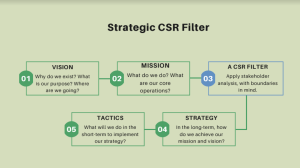Part 7: Implementation, Strategy, and Stakeholder Duties
91 What is a “CSR Filter”?
A key principle to consider when trying to implement ethics, stakeholder theory, and other CSR / ESG principles into the core operations of a company is the idea of a “CSR Filter”.[1] As a company operates, it often works with a mission and a vision. These may not be specifically articulated, but they always exist.[2]
- Mission: A short statement that describes the company’s core purpose, the what
- Vision: A short statement that describes the company’s future, the why
For instance, according to Amazon’s website, its mission statement is to “strive to offer our customers the lowest possible prices, the best available selection, and the utmost convenience.”[3] This is the “what” that describes Amazon’s core purpose: focus on consumers. This tells us several things. First, it means that customers are a key stakeholder for Amazon and will be considered deeply in decisions made by the company. Second, notice what is absent from this statement. The mission of Amazon is not to be, for instance, the most employee-centric firm on earth. Thus, worker warehouse conditions may receive secondary priority in discussions at the company. In contrast, Amazon’s vision statement is “to be the Earth’s most customer-centric company, where customers can find and discover anything they might want to buy online.” According to this statement, the company exists in order to enable online exchange.[4]
To implement its mission and vision, companies rely on strategy and tactics that direct what the company does on a day-to-day basis.
- Strategy = long-term plans that support the vision
- Tactics = short-term plans that support the mission, and implement the strategy
A strategy at Amazon might be to improve shipping times for consumers. The lower the shipping time, the more Amazon represents the world’s most consumer-centric company. A tactic at Amazon might be how warehouses are organized in order to improve shipping times. Both strategy and tactics are bounded. That is, they exist in the financial, environmental, and resource constraints of the real world. Particularly as one leaves business school and academic theories face tough realities.
With these terms and principles in mind, consider the idea of a CSR Filter. As the vision of the company flows through to a mission, a company can apply ethical and stakeholder analysis to consider how those principles flow through to business strategy and tactics.

For example, as Amazon contemplates strategies to make it the most consumer-centric company in the world, it might consider how its customers view warehouse conditions, or what effect improving warehouse conditions may have on shipping times, and whether improving those conditions may form part of being even a customer-centric company. It may form strategies that benefit customers while maintaining strong relationships with suppliers, the communities in which Amazon facilities are located, and so on.

Exercises
- For the company you have been considering in these exercises, find the company’s vision and/or mission statement. How do the company’s core operations implement these statements? If you can’t find specific statements, infer what the company would likely consider its vision or mission based on the information available.
- Consider an issue or challenge the company is facing. How might viewing that issue through a lens of ethics or stakeholder theory influence the company’s strategy or tactics?
- This material is based on the idea of a CSR filter in David Chandler, Strategic Corporate Responsibility (2017). ↵
- null ↵
- https://www.amazon.jobs/en/working/working-amazon ↵
- For a deeper view on Jeff Bezos's motivations, see https://www.theatlantic.com/magazine/archive/2019/11/what-jeff-bezos-wants/598363/. ↵

